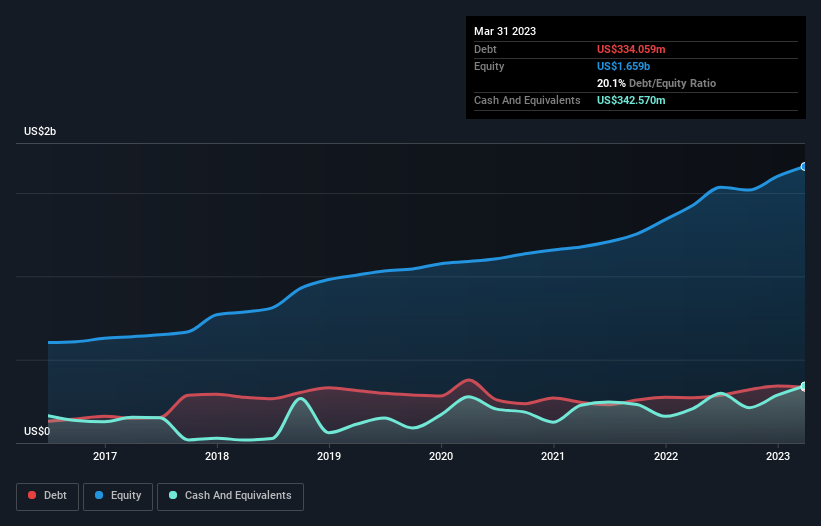Legendary fund manager Li Lu (who Charlie Munger backed) once said, 'The biggest investment risk is not the volatility of prices, but whether you will suffer a permanent loss of capital.' So it might be obvious that you need to consider debt, when you think about how risky any given stock is, because too much debt can sink a company. As with many other companies Hub Group, Inc. (NASDAQ:HUBG) makes use of debt. But the more important question is: how much risk is that debt creating?
Why Does Debt Bring Risk?
Debt and other liabilities become risky for a business when it cannot easily fulfill those obligations, either with free cash flow or by raising capital at an attractive price. Ultimately, if the company can't fulfill its legal obligations to repay debt, shareholders could walk away with nothing. However, a more frequent (but still costly) occurrence is where a company must issue shares at bargain-basement prices, permanently diluting shareholders, just to shore up its balance sheet. Of course, debt can be an important tool in businesses, particularly capital heavy businesses. The first thing to do when considering how much debt a business uses is to look at its cash and debt together.
See our latest analysis for Hub Group
How Much Debt Does Hub Group Carry?
As you can see below, at the end of March 2023, Hub Group had US$334.1m of debt, up from US$272.2m a year ago. Click the image for more detail. But it also has US$342.6m in cash to offset that, meaning it has US$8.51m net cash.

A Look At Hub Group's Liabilities
The latest balance sheet data shows that Hub Group had liabilities of US$637.7m due within a year, and liabilities of US$591.2m falling due after that. Offsetting this, it had US$342.6m in cash and US$701.1m in receivables that were due within 12 months. So its liabilities total US$185.3m more than the combination of its cash and short-term receivables.
Since publicly traded Hub Group shares are worth a total of US$2.42b, it seems unlikely that this level of liabilities would be a major threat. But there are sufficient liabilities that we would certainly recommend shareholders continue to monitor the balance sheet, going forward. Despite its noteworthy liabilities, Hub Group boasts net cash, so it's fair to say it does not have a heavy debt load!
On top of that, Hub Group grew its EBIT by 34% over the last twelve months, and that growth will make it easier to handle its debt. When analysing debt levels, the balance sheet is the obvious place to start. But ultimately the future profitability of the business will decide if Hub Group can strengthen its balance sheet over time. So if you want to see what the professionals think, you might find this free report on analyst profit forecasts to be interesting.
Finally, a company can only pay off debt with cold hard cash, not accounting profits. While Hub Group has net cash on its balance sheet, it's still worth taking a look at its ability to convert earnings before interest and tax (EBIT) to free cash flow, to help us understand how quickly it is building (or eroding) that cash balance. Over the most recent three years, Hub Group recorded free cash flow worth 52% of its EBIT, which is around normal, given free cash flow excludes interest and tax. This cold hard cash means it can reduce its debt when it wants to.
Summing Up
We could understand if investors are concerned about Hub Group's liabilities, but we can be reassured by the fact it has has net cash of US$8.51m. And it impressed us with its EBIT growth of 34% over the last year. So we don't think Hub Group's use of debt is risky. Another factor that would give us confidence in Hub Group would be if insiders have been buying shares: if you're conscious of that signal too, you can find out instantly by clicking this link.
If you're interested in investing in businesses that can grow profits without the burden of debt, then check out this free list of growing businesses that have net cash on the balance sheet.
Valuation is complex, but we're here to simplify it.
Discover if Hub Group might be undervalued or overvalued with our detailed analysis, featuring fair value estimates, potential risks, dividends, insider trades, and its financial condition.
Access Free AnalysisHave feedback on this article? Concerned about the content? Get in touch with us directly. Alternatively, email editorial-team (at) simplywallst.com.
This article by Simply Wall St is general in nature. We provide commentary based on historical data and analyst forecasts only using an unbiased methodology and our articles are not intended to be financial advice. It does not constitute a recommendation to buy or sell any stock, and does not take account of your objectives, or your financial situation. We aim to bring you long-term focused analysis driven by fundamental data. Note that our analysis may not factor in the latest price-sensitive company announcements or qualitative material. Simply Wall St has no position in any stocks mentioned.
About NasdaqGS:HUBG
Hub Group
A supply chain solutions provider, offers transportation and logistics management services in North America.
Flawless balance sheet and fair value.
Similar Companies
Market Insights
Community Narratives




